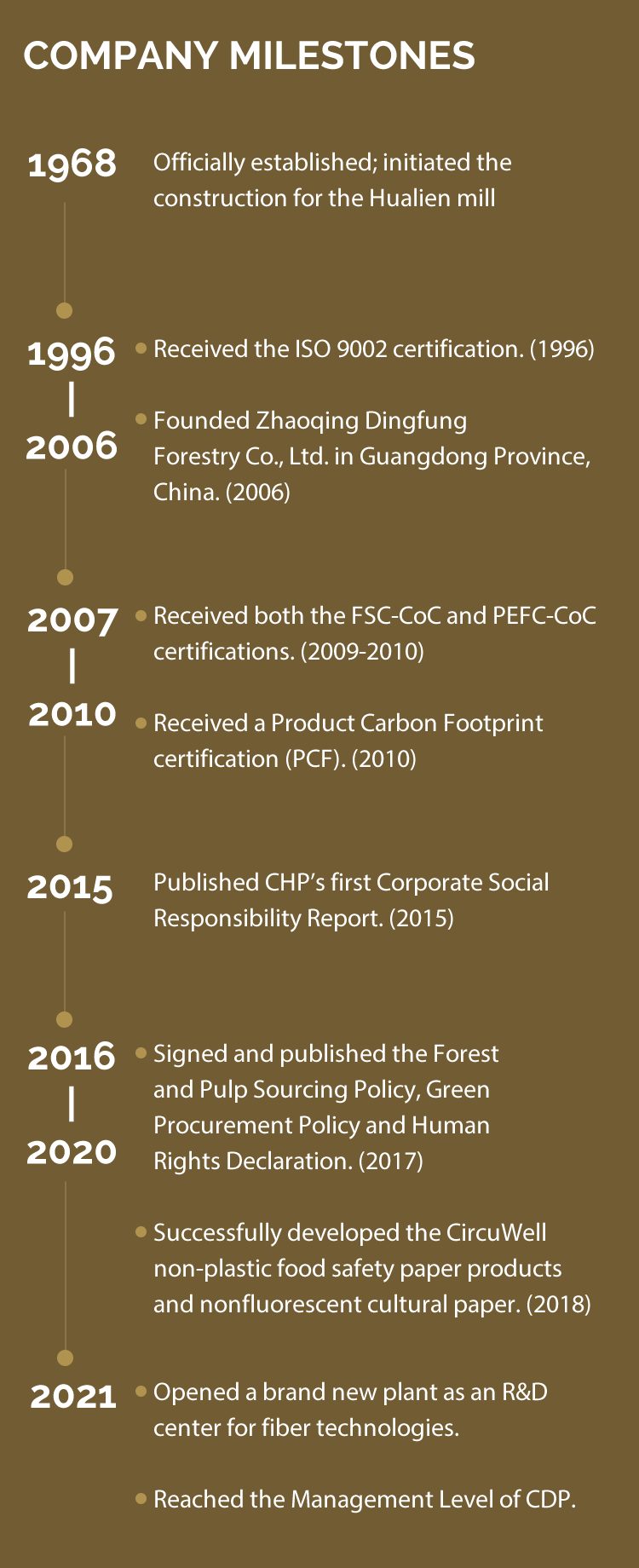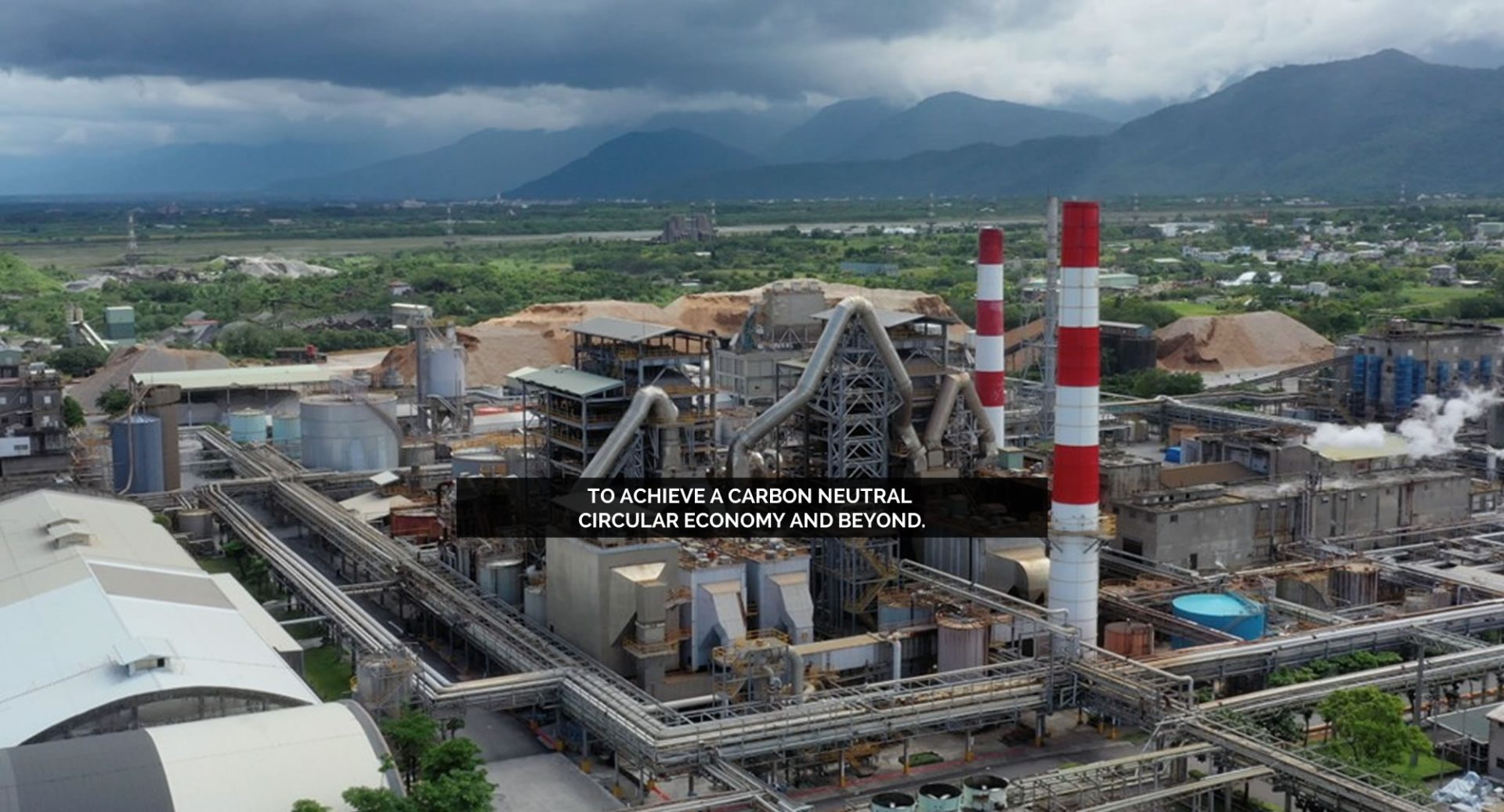
Information about the Company
Chung Hwa Pulp Corporation (CHP) was founded in 1968. As a major paper/pulp manufacturer in Taiwan, the company mainly engages in the production and sales of pulp, cardboard, printing paper, and specialty papers, as well as value-added products for food safety, health care, textiles, computer, communication, and consumer electronics. CHP is also focused on developing the field of fiber materials by introducing biotechnologies and chemical modification technologies, and on improving its environmental practices so that eco-friendly pulp-making methods are adopted, energy is used more efficiently, and waste is more effectively recycled. CHP is a benchmark enterprise in Taiwan’s paper industry with the island’s most comprehensive, integrated line of forestry, pulp, and paper mills.
CHP is committed to becoming “a circular economy leader that strives for carbon neutrality”, and we will strive to fully realize its sustainability vision by adhering to the principles of integrity, upholding a people-oriented core value system, and incorporating corporate governance, environmental, economic, and social aspects into its operations in accordance with the United Nations SDGs.
Company Culture & Company Activities
Impartiality and fairness are important principles that CHP abides by in its corporate culture. Legal compliance and the creation of a welcoming workplace for employees are the most fundamental commitments that CHP makes to its employees. CHP believes that every employee is deserving of respect and fair treatment. In 2021, CHP provided over 1,000 job opportunities in the Eastern part of Taiwan. More than 10,000 employees received education and training for over 30,000 hours. In addition, CHP has worked with social welfare organizations to promote education in rural areas and care for students from disadvantaged families and has shouldered the responsibility to safeguard its local communities. Around NTD40 million was donated to fund science education and computer programming education programs in rural areas and about 3,000 students have benefitted from them. When Taiwan saw an uptick in local COVID-19 cases, CHP also donated sodium hypochlorite solution to help combat the pandemic, distributing 10,000 tons of 500 ppm (diluted) hypochlorous acid-containing disinfectant solution.
Chung Hwa Pulp Corporation (CHP) was founded in 1968. As a major paper/pulp manufacturer in Taiwan, the company mainly engages in the production and sales of pulp, cardboard, printing paper, and specialty papers, as well as value-added products for food safety, health care, textiles, computer, communication, and consumer electronics. CHP is also focused on developing the field of fiber materials by introducing biotechnologies and chemical modification technologies, and on improving its environmental practices so that eco-friendly pulp-making methods are adopted, energy is used more efficiently, and waste is more effectively recycled. CHP is a benchmark enterprise in Taiwan’s paper industry with the island’s most comprehensive, integrated line of forestry, pulp, and paper mills.
CHP is committed to becoming “a circular economy leader that strives for carbon neutrality”, and we will strive to fully realize its sustainability vision by adhering to the principles of integrity, upholding a people-oriented core value system, and incorporating corporate governance, environmental, economic, and social aspects into its operations in accordance with the United Nations SDGs.
Company Culture & Company Activities
Impartiality and fairness are important principles that CHP abides by in its corporate culture. Legal compliance and the creation of a welcoming workplace for employees are the most fundamental commitments that CHP makes to its employees. CHP believes that every employee is deserving of respect and fair treatment. In 2021, CHP provided over 1,000 job opportunities in the Eastern part of Taiwan. More than 10,000 employees received education and training for over 30,000 hours. In addition, CHP has worked with social welfare organizations to promote education in rural areas and care for students from disadvantaged families and has shouldered the responsibility to safeguard its local communities. Around NTD40 million was donated to fund science education and computer programming education programs in rural areas and about 3,000 students have benefitted from them. When Taiwan saw an uptick in local COVID-19 cases, CHP also donated sodium hypochlorite solution to help combat the pandemic, distributing 10,000 tons of 500 ppm (diluted) hypochlorous acid-containing disinfectant solution.
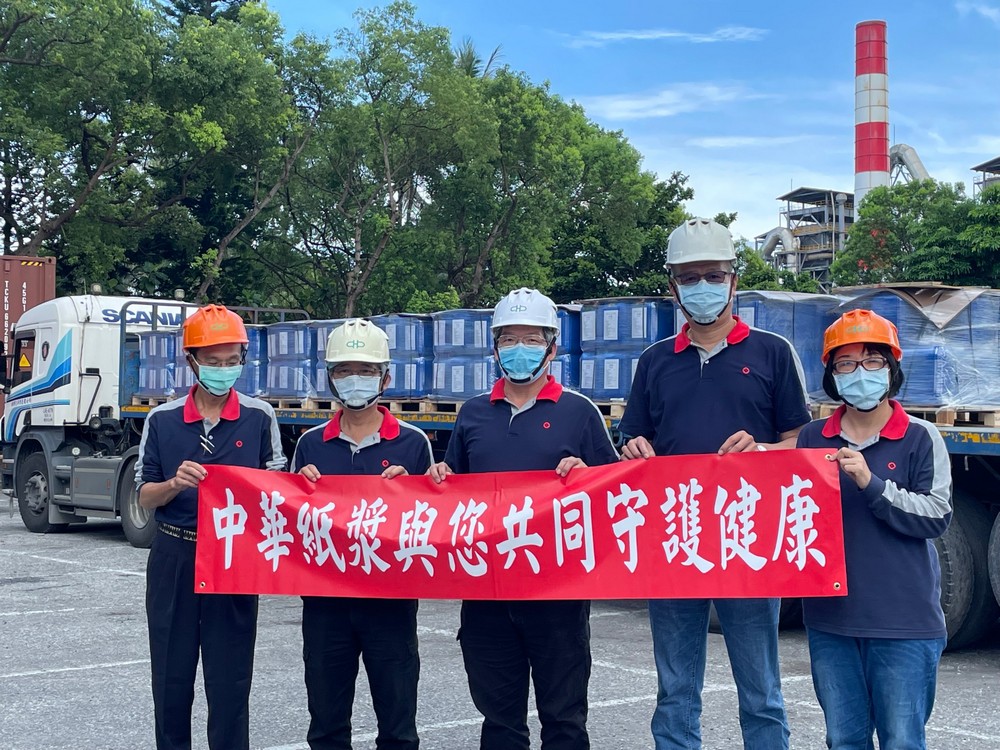
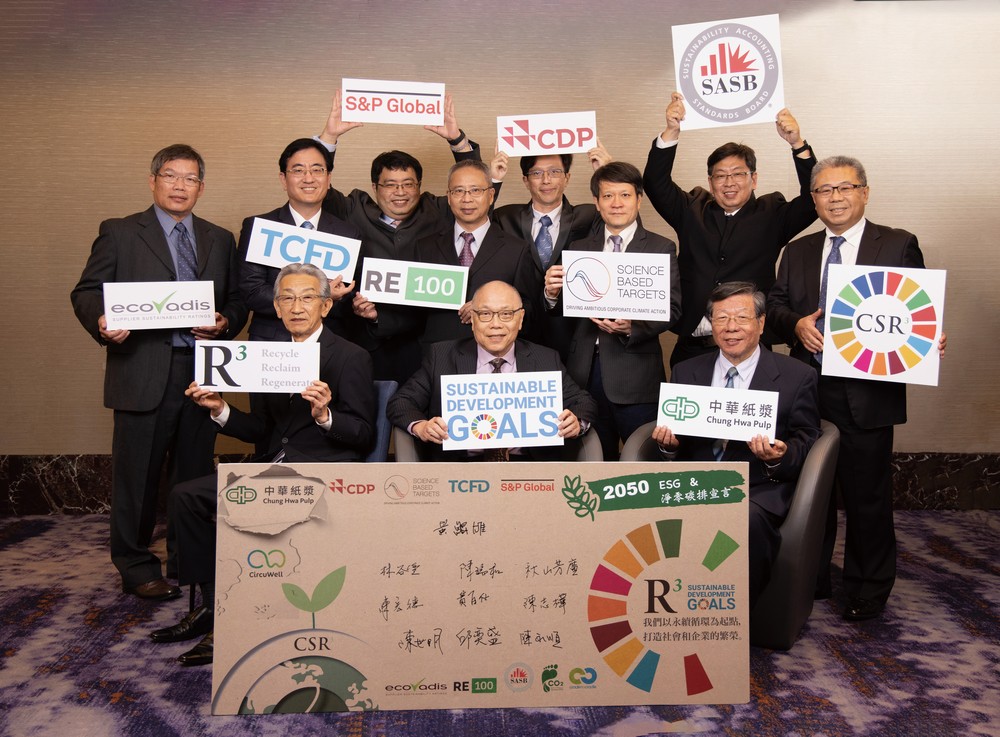
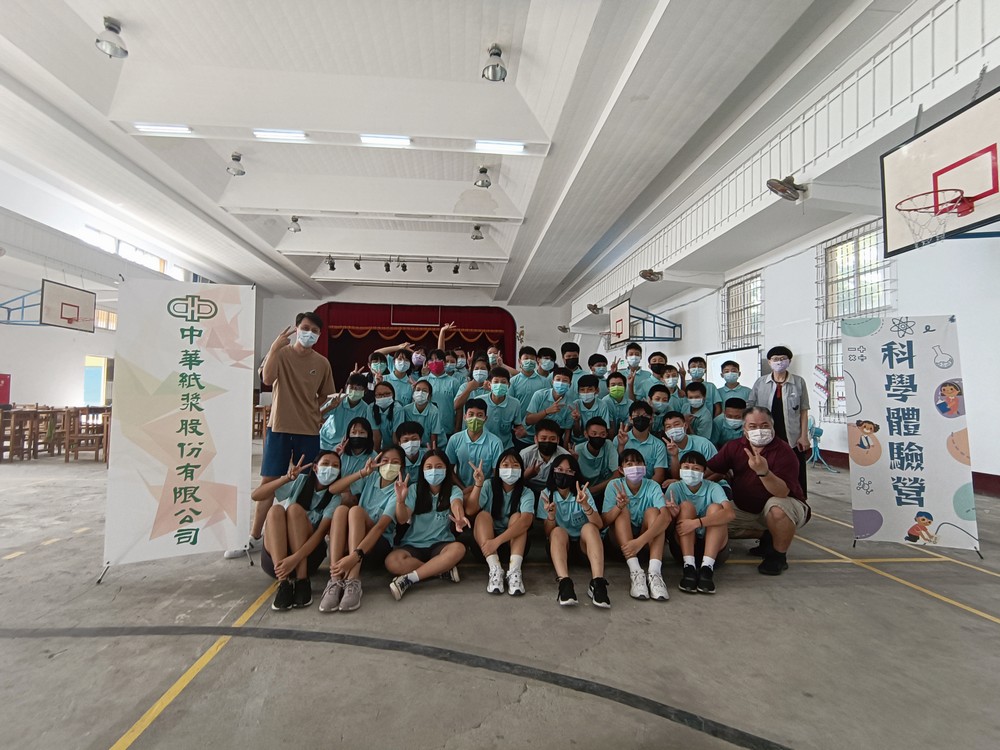
To achieve a carbon neutral circular economy and beyond.
Achievements & Impact
In 2021, CHP consolidated revenue of NTD22 billion (USD69,125,232). The company ranked top 21-35% in Taiwan’s corporate governance evaluation of public companies and reached CDP Management Level. Moreover, CHP invested USD3,286,736 in R&D. In the same year, CHP’s Taoyuan Guanyin Plant commenced operations for the research and development of non-plastic materials, marking its entry into the special materials market.
A suitable talent pool is key to creating a sound organization, and thus, ensuring corporate sustainability. CHP has a large pool of professionals with extensive experience. Among them, 4% are indigenous people and 1% are foreigners. CHP respects cultural practices; equality and anti-discrimination principles have always been at the core of its approach to treating employees from different cultures. For the year 2021, around 13% of the newly hired are disabled.
From raw materials to manufacturing, the members of the company are devoted to the management of the entire value chain. CHP is committed to sustainability and technological development to improve the utilization of materials, fine-tune manufacturing processes to develop low-carbon-footprint products, and strive for a circular economy to achieve its sustainability goals.
Future Direction
As the leading mill in Taiwan, CHP is committed to becoming a circular economy leader that strives for carbon neutrality. CHP has committed to compliance with ESG (Environmental, Social, and Governance) principles and the United Nations’ Sustainable Development Goals (SDGs) by moving forward with its corporate governance, environmental, economic, and social aspects on the basis of sustainability to become an inclusive and supportive enterprise. Furthermore, CHP relies on its 3R (Recycle, Reclaim and Regenerate) strategy to implement a sustainable management system. In the future, CHP plans to expand its 3R Strategy to the 7R Strategy which starts from Recycle, Reuse, and Reduce to Reclaim and Regenerate, and then back to Redesign and Rethink. CHP owns more than 30,000 hectares of forest plantation across Taiwan and China. As the only fully integrated forest, pulp, and paper mill in Taiwan, CHP has built a complete carbon fixation industry chain and continued to actively conserve energy, reduce carbon emissions to protect the Earth and the environment, develop low-carbon fibers, promote green energies, and construct a green supply chain so as to achieve its Roadmap to Carbon Neutrality.
In 2021, CHP consolidated revenue of NTD22 billion (USD69,125,232). The company ranked top 21-35% in Taiwan’s corporate governance evaluation of public companies and reached CDP Management Level. Moreover, CHP invested USD3,286,736 in R&D. In the same year, CHP’s Taoyuan Guanyin Plant commenced operations for the research and development of non-plastic materials, marking its entry into the special materials market.
A suitable talent pool is key to creating a sound organization, and thus, ensuring corporate sustainability. CHP has a large pool of professionals with extensive experience. Among them, 4% are indigenous people and 1% are foreigners. CHP respects cultural practices; equality and anti-discrimination principles have always been at the core of its approach to treating employees from different cultures. For the year 2021, around 13% of the newly hired are disabled.
From raw materials to manufacturing, the members of the company are devoted to the management of the entire value chain. CHP is committed to sustainability and technological development to improve the utilization of materials, fine-tune manufacturing processes to develop low-carbon-footprint products, and strive for a circular economy to achieve its sustainability goals.
Future Direction
As the leading mill in Taiwan, CHP is committed to becoming a circular economy leader that strives for carbon neutrality. CHP has committed to compliance with ESG (Environmental, Social, and Governance) principles and the United Nations’ Sustainable Development Goals (SDGs) by moving forward with its corporate governance, environmental, economic, and social aspects on the basis of sustainability to become an inclusive and supportive enterprise. Furthermore, CHP relies on its 3R (Recycle, Reclaim and Regenerate) strategy to implement a sustainable management system. In the future, CHP plans to expand its 3R Strategy to the 7R Strategy which starts from Recycle, Reuse, and Reduce to Reclaim and Regenerate, and then back to Redesign and Rethink. CHP owns more than 30,000 hectares of forest plantation across Taiwan and China. As the only fully integrated forest, pulp, and paper mill in Taiwan, CHP has built a complete carbon fixation industry chain and continued to actively conserve energy, reduce carbon emissions to protect the Earth and the environment, develop low-carbon fibers, promote green energies, and construct a green supply chain so as to achieve its Roadmap to Carbon Neutrality.
CORPORATE EXCELLENCE CATEGORY
Chung Hwa Pulp Corporation (CHP)
Information about the Company
Chung Hwa Pulp Corporation (CHP) was founded in 1968. As a major paper/pulp manufacturer in Taiwan, the company mainly engages in the production and sales of pulp, cardboard, printing paper, and specialty papers, as well as value-added products for food safety, health care, textiles, computer, communication, and consumer electronics. CHP is also focused on developing the field of fiber materials by introducing biotechnologies and chemical modification technologies, and on improving its environmental practices so that eco-friendly pulp-making methods are adopted, energy is used more efficiently, and waste is more effectively recycled. CHP is a benchmark enterprise in Taiwan’s paper industry with the island’s most comprehensive, integrated line of forestry, pulp, and paper mills.
CHP is committed to becoming “a circular economy leader that strives for carbon neutrality”, and we will strive to fully realize its sustainability vision by adhering to the principles of integrity, upholding a people-oriented core value system, and incorporating corporate governance, environmental, economic, and social aspects into its operations in accordance with the United Nations SDGs.
Company Culture & Company Activities
Impartiality and fairness are important principles that CHP abides by in its corporate culture. Legal compliance and the creation of a welcoming workplace for employees are the most fundamental commitments that CHP makes to its employees. CHP believes that every employee is deserving of respect and fair treatment. In 2021, CHP provided over 1,000 job opportunities in the Eastern part of Taiwan. More than 10,000 employees received education and training for over 30,000 hours. In addition, CHP has worked with social welfare organizations to promote education in rural areas and care for students from disadvantaged families and has shouldered the responsibility to safeguard its local communities. Around NTD40 million was donated to fund science education and computer programming education programs in rural areas and about 3,000 students have benefitted from them. When Taiwan saw an uptick in local COVID-19 cases, CHP also donated sodium hypochlorite solution to help combat the pandemic, distributing 10,000 tons of 500 ppm (diluted) hypochlorous acid-containing disinfectant solution.
Chung Hwa Pulp Corporation (CHP) was founded in 1968. As a major paper/pulp manufacturer in Taiwan, the company mainly engages in the production and sales of pulp, cardboard, printing paper, and specialty papers, as well as value-added products for food safety, health care, textiles, computer, communication, and consumer electronics. CHP is also focused on developing the field of fiber materials by introducing biotechnologies and chemical modification technologies, and on improving its environmental practices so that eco-friendly pulp-making methods are adopted, energy is used more efficiently, and waste is more effectively recycled. CHP is a benchmark enterprise in Taiwan’s paper industry with the island’s most comprehensive, integrated line of forestry, pulp, and paper mills.
CHP is committed to becoming “a circular economy leader that strives for carbon neutrality”, and we will strive to fully realize its sustainability vision by adhering to the principles of integrity, upholding a people-oriented core value system, and incorporating corporate governance, environmental, economic, and social aspects into its operations in accordance with the United Nations SDGs.
Company Culture & Company Activities
Impartiality and fairness are important principles that CHP abides by in its corporate culture. Legal compliance and the creation of a welcoming workplace for employees are the most fundamental commitments that CHP makes to its employees. CHP believes that every employee is deserving of respect and fair treatment. In 2021, CHP provided over 1,000 job opportunities in the Eastern part of Taiwan. More than 10,000 employees received education and training for over 30,000 hours. In addition, CHP has worked with social welfare organizations to promote education in rural areas and care for students from disadvantaged families and has shouldered the responsibility to safeguard its local communities. Around NTD40 million was donated to fund science education and computer programming education programs in rural areas and about 3,000 students have benefitted from them. When Taiwan saw an uptick in local COVID-19 cases, CHP also donated sodium hypochlorite solution to help combat the pandemic, distributing 10,000 tons of 500 ppm (diluted) hypochlorous acid-containing disinfectant solution.



To achieve a carbon neutral circular economy and beyond.
Achievements & Impact
In 2021, CHP consolidated revenue of NTD22 billion (USD69,125,232). The company ranked top 21-35% in Taiwan’s corporate governance evaluation of public companies and reached CDP Management Level. Moreover, CHP invested USD3,286,736 in R&D. In the same year, CHP’s Taoyuan Guanyin Plant commenced operations for the research and development of non-plastic materials, marking its entry into the special materials market.
A suitable talent pool is key to creating a sound organization, and thus, ensuring corporate sustainability. CHP has a large pool of professionals with extensive experience. Among them, 4% are indigenous people and 1% are foreigners. CHP respects cultural practices; equality and anti-discrimination principles have always been at the core of its approach to treating employees from different cultures. For the year 2021, around 13% of the newly hired are disabled.
From raw materials to manufacturing, the members of the company are devoted to the management of the entire value chain. CHP is committed to sustainability and technological development to improve the utilization of materials, fine-tune manufacturing processes to develop low-carbon-footprint products, and strive for a circular economy to achieve its sustainability goals.
Future Direction
As the leading mill in Taiwan, CHP is committed to becoming a circular economy leader that strives for carbon neutrality. CHP has committed to compliance with ESG (Environmental, Social, and Governance) principles and the United Nations’ Sustainable Development Goals (SDGs) by moving forward with its corporate governance, environmental, economic, and social aspects on the basis of sustainability to become an inclusive and supportive enterprise. Furthermore, CHP relies on its 3R (Recycle, Reclaim and Regenerate) strategy to implement a sustainable management system. In the future, CHP plans to expand its 3R Strategy to the 7R Strategy which starts from Recycle, Reuse, and Reduce to Reclaim and Regenerate, and then back to Redesign and Rethink. CHP owns more than 30,000 hectares of forest plantation across Taiwan and China. As the only fully integrated forest, pulp, and paper mill in Taiwan, CHP has built a complete carbon fixation industry chain and continued to actively conserve energy, reduce carbon emissions to protect the Earth and the environment, develop low-carbon fibers, promote green energies, and construct a green supply chain so as to achieve its Roadmap to Carbon Neutrality.
In 2021, CHP consolidated revenue of NTD22 billion (USD69,125,232). The company ranked top 21-35% in Taiwan’s corporate governance evaluation of public companies and reached CDP Management Level. Moreover, CHP invested USD3,286,736 in R&D. In the same year, CHP’s Taoyuan Guanyin Plant commenced operations for the research and development of non-plastic materials, marking its entry into the special materials market.
A suitable talent pool is key to creating a sound organization, and thus, ensuring corporate sustainability. CHP has a large pool of professionals with extensive experience. Among them, 4% are indigenous people and 1% are foreigners. CHP respects cultural practices; equality and anti-discrimination principles have always been at the core of its approach to treating employees from different cultures. For the year 2021, around 13% of the newly hired are disabled.
From raw materials to manufacturing, the members of the company are devoted to the management of the entire value chain. CHP is committed to sustainability and technological development to improve the utilization of materials, fine-tune manufacturing processes to develop low-carbon-footprint products, and strive for a circular economy to achieve its sustainability goals.
Future Direction
As the leading mill in Taiwan, CHP is committed to becoming a circular economy leader that strives for carbon neutrality. CHP has committed to compliance with ESG (Environmental, Social, and Governance) principles and the United Nations’ Sustainable Development Goals (SDGs) by moving forward with its corporate governance, environmental, economic, and social aspects on the basis of sustainability to become an inclusive and supportive enterprise. Furthermore, CHP relies on its 3R (Recycle, Reclaim and Regenerate) strategy to implement a sustainable management system. In the future, CHP plans to expand its 3R Strategy to the 7R Strategy which starts from Recycle, Reuse, and Reduce to Reclaim and Regenerate, and then back to Redesign and Rethink. CHP owns more than 30,000 hectares of forest plantation across Taiwan and China. As the only fully integrated forest, pulp, and paper mill in Taiwan, CHP has built a complete carbon fixation industry chain and continued to actively conserve energy, reduce carbon emissions to protect the Earth and the environment, develop low-carbon fibers, promote green energies, and construct a green supply chain so as to achieve its Roadmap to Carbon Neutrality.


